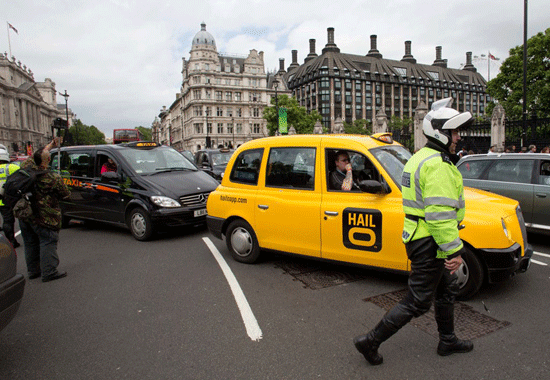London Games to open in troubled times
 0 Comment(s)
0 Comment(s) Print
Print E-mail China Daily, July 24, 2012
E-mail China Daily, July 24, 2012
|
|
|
Hundreds of London taxi drivers protest against being excluded from using the Olympic "Zil" Lanes and bring London traffic to a stand still on July 17, 2012. [Photo/CFP] |
London, an ancient city steeped in theater and pageantry, stages its third summer Olympics against a sombre backdrop tempering the excitement and anticipation before the world's greatest sports festival.
Euphoria in Singapore, where London secured the Games in 2005, was succeeded within 24 hours by horror in the British capital when 52 commuters were killed by four suicide bombers.
Consequently the Games of the XXX Olympiad, opening at the Olympic stadium in east London on Friday, will feature Britain's largest peacetime security operation which has further inflated the budget in troubled economic times.
"The security threat comes from a number of diverse actors ranging from al-Qaida affiliated terrorists, lone wolves acting independently, Irish Republican Army offshoots as well as anarchists," said an assessment from the Asia-Pacific Foundation, a London-based think tank.
"Another potential danger is street violence similar to the wild, apparently spontaneous and totally unpredictable riots, that hit parts of London for five days in August 2011, causing hundreds of millions of pounds in property damage."
London's creaking transport system, criticized as "often obsolete" by International Olympic Committee inspectors after the city was short-listed for the Games, is another problem.
So, too, is the unpredictable British climate during a summer of unrelieved gloom and drenching rain, although signs that the weather gods may have finally relented came at the weekend with clear skies, rising temperatures and optimistic forecasts.
On the plus side, the Asia-Pacific Foundation report pointed out that Britain has a "very successful track record" in hosting major sports events, a point stressed by London 2012 Olympics organizing committee chairman Seb Coe.
"You do not want people coming to London feeling they have come to a siege town," Coe told Reuters. "London stages these global events all the time and often at the same time. We have a good track record but I am not being remotely cavalier or particularly sanguine about the nature of what we have to do."
London held the 1908 Olympics at the height of the golden Edwardian summer when Britain ruled much of the world. The 1948 Games were hosted by a city ravaged by wartime bombing in an emotionally and physically exhausted country burdened by a record debt.
In a link with the past, the Olympic Park is located in an area of London which suffered some of the worst bombing in World War Two, as part of a program of economic regeneration.
Unparalleled sporting history
Britain possesses an unparalleled sporting history, stemming from that astounding period in Victorian Britain when the rules for virtually all the games now played throughout the world were either invented or codified.
"We're coming to a nation that invented modern sport in the second half of the 19th century," IOC president Jacques Rogge said at Formula One's British Grand Prix this month.
"We're also coming to a nation that has included sport in its school curriculum and it's a nation that loves sport, knows sport, and that will show."
The Olympic movement has been criticized as bloated, grandiose and in thrall to the sponsors and television companies who provide the money which underpins modern sport.
No credible alternative economic model exists and, even if the IOC ceased to exist, the sports and leisure industries would soon entice the individual federations into new multi-sports commercial ventures.
Under Rogge, the IOC has moved with the times and there is also nothing remotely bloated about the background of the athletes expected to make the most impact when the track and field competition, the core sport of the Games, starts on Aug 3. Usain Bolt electrified the Bird's Nest stadium in Beijing four years ago with world records in the 100 and 200 meters followed by a third as a member of the Jamaican 4x100 relay squad.
Bolt is coached by Glen Mills at the Racers Track Club in Kingston, where the facilities are rudimentary but the work ethic relentless.
After Bolt again shattered the world 100 and 200 records at the 2009 Berlin world championships, clocking a scarcely credible 9.58 and 19.19 seconds, another golden double in London seemed a formality provided he remained fit and focused.
Four years, though, is a long time in the life of any athlete and now another sprinter from the Racers Track Club threatens to dethrone Bolt in London.
Yohan Blake rejoices in the nickname of "The Beast", a tribute to his ferocious appetite for training. Whereas Bolt is tall, lean and languid, Blake is compact, muscular and explosive.
At the Daegu world championships last year, Blake won the 100 metres after Bolt was disqualified for a false start. This year he beat Bolt, who has been hampered by a right hamstring strain, decisively in both the 100 and 200 at the Jamaican Olympic trials.
The 100 metres is the most exciting and the most elemental of races, equivalent to a world heavyweight title fight in that the winner of the former can plausibly claim to be the fastest man in the world while the victor of the latter can say he is the meanest.
It is also the most unforgiving. "In the 100 metres a single mistake can cost you victory," said Carl Lewis, winner of nine Olympic track and field titles.
Lewis is the only man to retain the Olympic 100 title, albeit through the disqualification of Ben Johnson at the 1988 Seoul Olympics after a positive drugs test.
In London, the race is likely to be won and lost at the start. Because of his height, Bolt is slow to unwind out of the blocks but if he does get away swiftly there is nobody in the world who can touch him.






